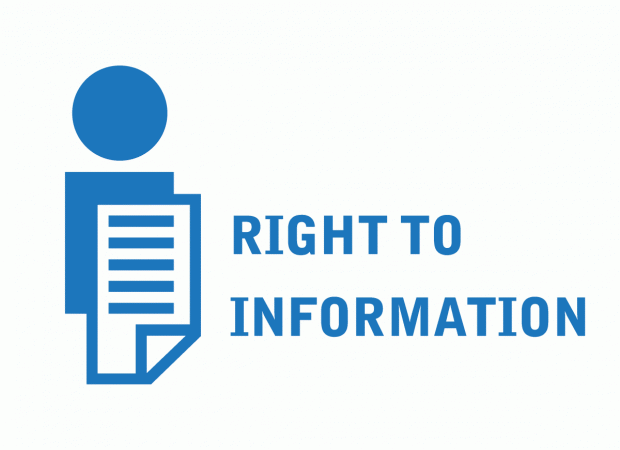
Jammu & Kashmir Right to Information Act 2009 (RTI law) completed 10 years of its enactment in March this year. Including the RTI law enacted in the year 2004 (J&K RTI Act 2004), it has been almost 15 years since this law has been operational in our state.
The 2004 RTI law was repealed when Jammu & Kashmir state legislature came up with a much robust information law in 2009. After more than a decade, we still have bad governance and maladministration in Jammu & Kashmir. Corruption is still a big challenge.
The main reason is lack of awareness and non-implementation of transparency laws which unfortunately are to be implemented by the same Government officials who are looting state exchequer.
Being a campaigner of RTI Act in J&K, I have written a lot on RTI from the last 12 years. Not only have I been writing but our dedicated campaigners have been trying their level best to create awareness about this legislation without any resources as NGO funders hardly support initiatives like anti-corruption work or activities related to transparent governance.
After keenly observing the developments around RTI regime in my state, I have come to the conclusion that Government officials do not want this law to flourish. It is because of this that the implementation and awareness about the act have been dismal and pathetic in the state for the last 5 to 6 years.
Legal obligations
Under section 23 of the J&K RTI Act 2009, the government is under a legal obligation to undertake information, education and communication (IEC) programmes on RTI law. This awareness campaign is especially to be undertaken among disadvantaged communities living in far off areas of J&K.
In addition to it, the government has to train its officials, especially the designated First Appellate Authorities (FAAs) and Public Information Officers (PIOs). These officers have to be sensitized about the provisions of the law. As Government failed to do so, our organization Jammu &Kashmir RTI Movement filed a Public Interest Litigation (PIL) before the state High Court last year.
The Court disposed of the PIL within a few months directing the government to create awareness and to make a voluntary disclosure of information under sections 23 and 4 of the J&K RTI Act 2009 respectively. This was our main prayer before the High Court. In spite of the December 2018 High Court directions, the government continues to violate this law. We are now mulling for contempt proceedings in the coming weeks.
Before moving to High Court with a PIL, J&K State Information Commission (SIC), an autonomous institution created under State RTI law of 2009 also issued several circulars and notices to Government to adhere to the provisions of section 4 and 23 of J&K RTI Act 2009.
Former State Chief Information Commissioners (CICs) G R Sufi and Khurshid Ahmad Ganai issued several circulars reminding the Government to make a voluntary disclosure of information on official websites of different public authorities and impressed upon the government to undertake RTI awareness campaigns under section 23 of J&K RTI Act 2009. Government hardly bothered to adhere to the circulars and notices.

High Court order disrespected
More than 6 months have passed since the PIL on RTI implementation was disposed of by Hon'ble High Court of J&K. But the awareness camps or proactive disclosure of the information is yet to be initiated.
To implement the said high court direction, the government has not even issued a formal order or circular till date. I am dismayed and distressed by the administration which has not taken any concrete steps to implement the provisions of J&K RTI Law. The State Information Commission (SIC) which is a quasi-judicial body for implementation of the RTI Act, has a lone Information Commissioner while two commissioners are not being appointed for last 1 year.
It took 6 months or more for Governor of J&K to implement his own decision called State Administrative Council (SAC) decision vis a vis declaring J&K Bank as Public Authority by bringing the bank under the ambit of Right to Information (RTI) law.
After the PIL on RTI implementation was filed, Government got exposed vis a vis conducting training RTI workshops for its citizens and designated officers (PIOs and FAAs). When details of awareness camps and workshops were submitted before the Hon'ble High Court by the government, it was shocking to know that mere two RTI workshops had been conducted in last 3 years (until Oct 2018) by the government through Institute of Management Public Administration & Rural Development (IMPARD). During these two workshops, only 42 officers had been trained.
Pertinently from the year 2011 to 2013 more than 75 RTI workshops were conducted by IMPARD wherein more than 2500 officers were trained. This indicates that the government has failed to even create awareness for its own officers. Creating awareness among disadvantaged communities seems to be a distant dream.
Conclusion
Jammu & Kashmir Governor Satya Pal Malik has been saying that corruption is a serious problem in J&K and needs to be dealt with an iron fist. Everybody knows that RTI helps to make government accountable before citizens.
The information which can't be denied to a member of the state legislature or parliament can't be denied to a citizen as well and this is well explained in the RTI law. It is also a fact that RTI checks corruption and ensures empowerment of people. If the government is serious about eradicating corruption, then the institutions that help to reduce corruption need to be strengthened.
RTI thus need not only to be strengthened but this law should be institutionalized as well. If people don't know how to file an RTI application or how to pay RTI application fees even after 10 years of enactment of this law in J&K, I believe this is an utter failure of the government.
If the government is not able to create awareness about this law or lacks the manpower to train PIOs and designated officers, why can't this job be outsourced to Non-Governmental Organizations (NGOs) or other institutions who undertake capacity building programmes and workshops? If NGOs can be asked to assist the government in creating awareness on Beti Bachao, Beti Padhao, Consumer Rights, AIDS, Environmental issues etc why can't they be asked to undertake RTI awareness as well?
Dr Raja MuzaffarBhat is Chairman of Jammu & Kashmir RTI Movement. He is also an Acumen India fellow from 2017 cohort.
Feedback : bhatrajamuzaffar@gmail.com















